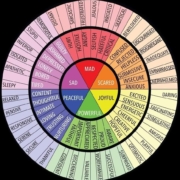Perpetual issues permeate every relationship. A perpetual issue is essentially an unresolvable problem, kind of like having a bad back when you age. We learn to live with chronic conditions like this and to make the best of things in spite of them. BTW, did you realize that marriage allows you to have the special privilege of annoying one person in particular for the rest of your life? Uhmmm…and the other way around as well? By definition, when you enter a relationship, you have chosen a set of problems that you will deal with for the duration of that relationship. Here’s an example of what I mean by a perpetual issue, and a technique for managing it called a gentle start up.

Perpetual Issue Example: Let’s say one partner is a bit of a slob, and the other is a neatnik.
Partner 1: “It’s Saturday and you have not picked up your crap once all week! I always end up picking up after you, and the Wilsons coming for dinner tonight. The trouble with you is that…”
Partner 2: “Gees! There you go again. The problem [as partner mimics the tone of the other] with you is blah, blah, blah. What can’t you put a sock in it for once? There is nothing wrong with me that a trip to Tahiti wouldn’t fix, as long as you stayed in Poughkeepsie!”
Partner 1: “Oh very funny. While you run off to the office or the golf course with your buddies, I am stuck with the all the cleaning and dinner prep. And you’re too busy surfing your iPad to even look up to see that I’m nearly done!”
Partner 2: “I guess clearing the gutters and going to the grocery store last week don’t count with you. Much less bringing home the paycheck you spend so easily.”
Time To Rewind!
Partner 1: “Goodness. Look at this house; it is a flippin’ mess. Remember, the Wilsons are coming for dinner tonight. Is there any chance you could help me pick up a bit? Maybe run the vacuum?”
Partner 2: “I think so, (laughing) they let me use the stapler at work, so maybe I can manage. At least you didn’t make me scrub the toilets! Hey, maybe I can run out and pick up those oysters you wanted to roast, too, if that helps.”
Partner 1: “Awesome! That would be such a time relief for me! And hon, you never know what effect those oysters might have later on…”
So what happened?
In the first, partner 1 opened the conversation harshly, with criticism, you might say. You can tell criticism because it tends to attack the person’s character. And not unpredictably, she got a sarcastic, unhelpful response.
In the second version, she opened with a gentle start up and made a specific request (a statement of need vs a criticism) saying what she needed without pinning her partner to the wall. She did not blame, and she simply described what is happening that evening, offering a reminder of the company coming. She was polite. And she responded with a little humor, a trait both of them demonstrated. Humor was used in service to the relationship vs the sarcasm (or contempt, which id deadly to a relationship) in the first example where it was tearing the relationship apart.
To Sum Up
Say what you need: Could you help me?
About what: With preparing for our company.
Get specific: Picking up the oysters and vacuuming.
A touch of humor and politeness helps: You never know about the effect of those oysters…
I hope you can see the benefit of using a gentle start up, and that the example given is helpful. Conflict will always appear in a relationship from time to time, but it does not have to derail you. Learning how to manage it is a skill you can practice. If you need a little guidance in your special relationship, call me or shoot me an email. I’m in your neighborhood and ready to help.
A good read on the topic: John Gottman’s The Relationship Cure










